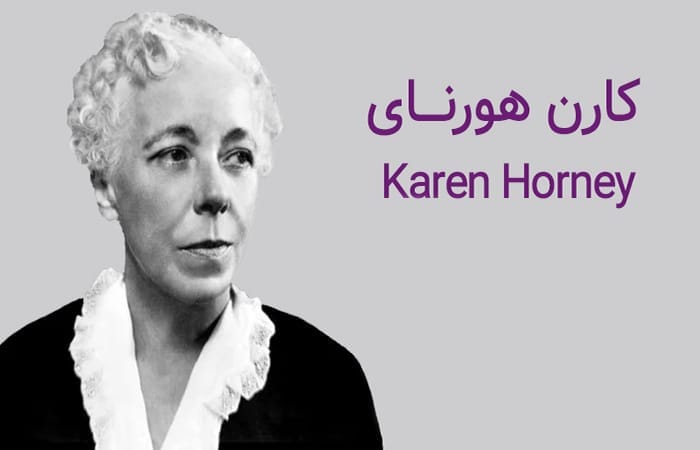
Blog
Karen Horney

Karen Danielson Horney, a German doctor and psychoanalyst who played an important role in the field of personal psychology and women’s psychology and emphasized the role of self-exploration in mental health. German doctor Karen Horney was born in 1885 in a village near the city of Hamburg. He graduated in medicine and psychiatry and then immigrated to America and taught as a university professor in the field of psychoanalysis. With the help of some of his students, Hornay established the Hornay Institute of Psychoanalysis in New York, which is currently managed by his students.
فهرست عناوین
ToggleKaren Horne’s ideas
Karen Horne’s theories are:
Basic anxiety
Karen Horne believed that basic anxiety is the basis of neurosis. He considered basic anxiety as a pervasive and hidden feeling of being alone and helpless in a hostile world.
Karen Horne was a neo-Freudian psychoanalyst who focused on the problem of neurosis. According to Karen Horne, a person who is involved in neurosis will not have the ability of self-knowledge and self-awareness. Neurosis, like chains, hinders a person’s movement and wastes the potential he could have for life. Neurosis is a dysfunctional and maladjusted way of life in that the neurotic person uses obsessions and depression to survive. For this reason, Karen Horne considered neurosis to be a type of “distorted view of the universe” that, through this type of view, a person loses the set of needs and mandatory do’s and don’ts for himself and the real life.
Introduction to: Friedrich Wilhelm Nietzsche
Definition of neurosis
Horne believed that neurotic people always try to be at the top and the best. In fact, they somehow tie their inner value to the external factor and collapse at the slightest dissatisfaction. A neurotic person experiences a deep gap between his ideal self and his real self, which is impossible to bridge. This mental inconsistency and conflict between what really is and what should be, causes a waste of time, mental energy, and causes frustration and depression.
A neurotic person draws unrealistic goals for himself, and because these goals are ideal and do not correspond to his real abilities, he fails and gets frustrated.
In her self-knowledge book, Karen Horne expressed the theory of neuroticism and described the types of needs and different types of neurotic behavior.
According to him, the types of abnormal needs are:
- The need for love and approval
- The need for a domineering wife
- The need for power
- The need to exploit others
- Need for social credit
- The need to be admired
- Need for success and ambition
- The need for self-sufficiency and independence
- The need for perfectionism

These needs are never fully met and sometimes they conflict with each other, which is the source of a person’s internal conflicts.
Hornay believed that a neurotic person acts in three ways to resolve his internal conflicts:
- Move towards people
- Movement against the people
- Get away from people
Moving towards the people
In an extreme way, they show their need for approval and attention seeking. They are subservient to others and tie their value to the opinion of others. The reason for the formation of this neurotic need is the fear of loneliness and rejection. Therefore, they hate criticism and try to be popular with others.
Movement against the people
People of this group often seek power and behave aggressively and domineeringly. They ignore the people and present themselves to the people as a higher and more informed power. To experience the sweet feeling of victory, they need to defeat others. Such people are afraid of losing control and being hurt, so they try not to be incompetent and helpless and not to be violated by others.
Get away from people
In this group, a person feels independent and needs to express self-sufficiency and extreme independence. A reclusive person is afraid of being hurt by others, so he keeps a distance and keeps himself away under the pretext of independence.
Due to the fact that all three groups build a strong mental wall around themselves that they cannot communicate with others to know their real desires in communication, they do not have the ability of self-knowledge and self-awareness.
Horne believed that a neurotic person performs these actions compulsively and in an extreme manner. If a normal person chooses and uses these actions in some cases and that too freely.
Karen Horne’s Feminist Psychology
Karen Horne has mentioned the following in the field of female psychology:
Jealousy of the womb
Unlike Freud, Karen Horne believed that men envied women because of their ability to become mothers. He proposed this theory against Freud’s theory of jealousy. Hornay believed that jealousy of the womb appears unconsciously in the behavior of men in the form of underestimating and understating the importance of women.
Escape from femininity
Women in the society, due to the feeling of inferiority, may deny their femininity and unconsciously wish they were men. If this conflict is strong, it can cause emotional disturbances in women and problems in their relationships with men.
Motherhood and work
Karen Horne believed that today’s women are seeking recognition of their identity by strengthening their self-employment skills in the social environment. According to him, the traditional role of the mother and the modern role of the working woman creates a conflict in women, which causes many problems.
Also, because Horne had the experience of treating women in both America and Germany, he came to believe that different cultures cause different characteristics in women and women define different roles for themselves according to those characteristics.
Books by Karen Horney
- self-exploration
- The nervous personality of our time
- Nervousness and human growth
- Feminine psychology
- Internal conflicts
- New ways in psychoanalysis
برای مشاوره رایگان و رزرو وقت (یا اگر تماس گرفتید و قادر به پاسخگویی نبودیم) شماره تماس خود را وارد کنید. ما به زودی با شما تماس می گیریم!




